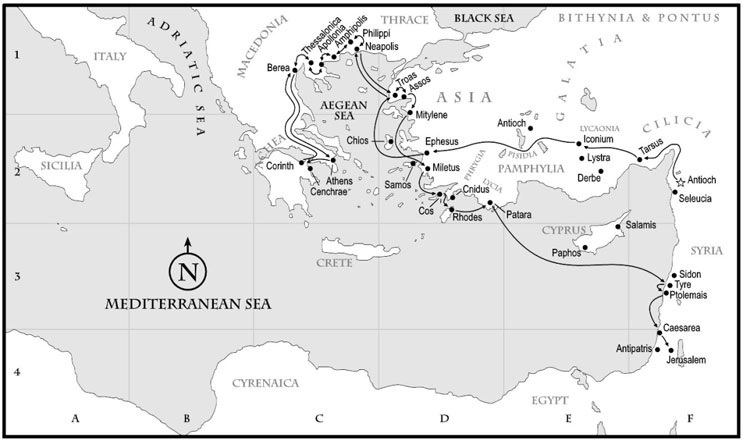|
This morning we begin our journey into the book of Philippians. If you have not already done so I encourage you to take about 30 minutes and sit down and read through the entire book. The schedule for this week looks like this: Monday: Phil. 1:1-2 Tuesday: Phil. 1:3-5 Wednesday: Phil. 1:6-8 Thursday: Phil. 1:9-11 Friday: a day of reflection That is one of the things I love about the SOAP method I was introduced to in 2011- just two or three verses a day, easy to handle no matter your schedule, no matter the pressing needs of your day. I think it is safe to say most of us can find 5 minutes in our day to read the Bible. Now let me walk you through my "soapy" method, as one of my sweet friends calls it. S stands for Scripture, that is where we start. On a sheet of paper, a notebook, journal, whatever- write down the verses for the day. Philippians 1:1-2 Paul and Timothy, bond-servants of Christ Jesus, to all the saints in Christ Jesus who are in Philippi, including the overseers and deacons: Grace to you and peace from God our Father and the Lord Jesus Christ.. O stands for observation. All you need to do at this point is make two or three observations about the Scripture verses. I often elaborate on my observations, but that is just my way. What do I observe about these verses? 1. Well for starters it is from Paul and Timothy. The "and Timothy" has caught my attention for the first time. It was quite common to dictate letters in those days, so quite probably this letter was dictated to Timothy by Paul. 2. They refer to themselves as bond-servants of Christ. Paul begins this letter in a unique way. In almost every other letter he has written Paul includes his calling as an apostle. "Paul, a bond-servant of Christ Jesus, called to be an apostle" in Romans, 1:1 and Titus 1:1 or "Paul an apostle" in 1 Corinthians 1:1, 2 Corinthians 1:1, Galatians 1:1, Ephesians 1:1, Colossians 1:1, 1 Timothy 1:1, and 2 Timothy 1:1. In this letter to the Philippians he simply states that he is a bond-servant of Christ Jesus. It makes me wonder if perhaps Paul had a special relationship with the church at Philippi, one in which it was not necessary for him to establish his authority. 3. This letter was written to all the saints in Philippi, including the overseers and deacons. Most of the time I do not feel like much of a saint, but that is because my definition is messed up. The word saint is translated from the Greek word hagios which according to my Greek dictionary "Fundamentally signifies separated...separated from sin and therefore consecrated to God. So we are a separate people because we belong to God. An important distinction for the Christians in this Roman colony of Philippi and for me in the USA. For some background on this book I read Acts 15:35-17:1 and being a history buff I just have to include some of the interesting details I learned as I researched Philippi and Paul's connection to it. Phillipi was founded in 368 BC by Philip, the father of Alexander the Great. It is located in present day Greece and was an important strategic location for Rome. At one time it was known for its wealth from gold and silver mines. Located in the range of hills that divide Asia from Europe and Philippi sat on the pass controlling the road that joins these two continents. Very important strategically and thus it was that it became a Roman colony. (See Acts 16:12) Roman colonies were settled by veterans of the Roman army, about 300 of these men and their families would be relocated after their terms of service concluded to colonize a city with loyal citizens of Rome. So when Paul, Silas, Timothy, and Luke arrived there during Paul's second missionary journey there were very few Jews, not even enough to have a synagogue, which seems to mean that there were less than 10 Jewish men living in Philippi at the time according to several sources I read. This was a city of loyal Roman citizens. Citizens who were very proud of their Roman citizenship, speaking the language, wearing the clothes, following the customs,-they were very much Romans and would never dream of becoming like the people in the area to which they had been sent. (see Acts 16:19-21) Paul and his companions stayed in Philippi for several days and while there some very interesting things took place.
It is here that they meet Lydia, a woman from Thyatira (in Asia) who was a merchant in very expensive cloth . And it is in Philippi where they run into serious trouble with the locals. Paul heals a slave girl (most likely a native Greek) who was quite the money-maker for her masters and they bring accusations against Paul and Silas to the authorities who beat them and throw them in prison (all devoted Roman citizens). While in prison a great earthquake came and all of the prisoners were freed. The fearful jailer (also a devoted Roman) and his entire household end up professing faith in Jesus Christ and are baptized that very night. (See Acts 16:16-40) It is interesting to note that in these three people, Lydia, the slave girl, and the jailer we gain a wonderful picture of the all-encompassing Gospel- it is for the rich: Lydia the merchant; the poor: the slave-girl; and all those in-between: the jailer. A stands for application. Sometimes it can be hard to find an application, but this is the point where you try to find one or two things that you can take from your reading and apply to your life. Paul defines himself as "a bond-servant of Christ Jesus." He may be imprisoned in Rome as he writes this letter but he views himself as a doulus which is the Greek for slave. There are some implications in that word that I think are important. First of all a slave is bought with a price- Jesus loves me and paid for me with His own death on the cross, I have been purchased with His blood that was poured out for me. Secondly, slaves have no will of their own, everything they do is the will of their master, and their master alone. To Jesus I owe my obedience and to no one else. To be this kind of servant to Jesus is not cowering submission- but the recognition that to submit to His will brings freedom, brings a greater joy, brings grace and peace. His authority over me is not that of a hardened taskmaster but of one who loves me supremely and knows what is best for me. A bond-servant of Christ has received His amazing grace, that unmerited forgiveness of sins that brings me into fellowship with Him and grants me perfect peace. Nothing can take that away from me, not any circumstance, not any person. Jesus has sole authority over my life, so it is time to stop listening to all the other voices, time to stop letting circumstances dictate my life. Oh that is so easy to say, quite another to put into practice. The place to start seems to be in daily reminding myself who is really master of my life and willingly-even joyfully, submit to His authority. P stands for prayer. It is time to take what I have learned and go to the Lord with my thoughts. To spend some quiet time this morning seeking His will and releasing my own. I have read these verses numerous this past week and every time this song pops into my head. Let me share it with you to close out this morning's thoughts. Grace and Peace by Fernando Ortega I hope you will jump in with comments/emails to let me know how you are doing, to share your own "Soapy" thoughts from these verses, for it is my prayer that this will be a place of encouragement to all who stop by here on their journey to know God more. Grace and Peace, Deb
0 Comments
Leave a Reply. |
AuthorI am a woman with a Mary heart and these are my musings as I read and study God's Word Join me on facebookArchives
October 2014
Follow me on Twitter |
Tuning My Heart Quilts by Debra Davis is licensed under a Creative Commons Attribution-NonCommercial-NoDerivs 3.0 Unported License.
Based on a work at www.tuning-my-heart.com.
Copyright 2010-2022 by Tuning My Heart Quilts, LLC. No part of this website can be reproduced without written permission from the author. All rights reserved.
Proudly powered by Weebly





 RSS Feed
RSS Feed